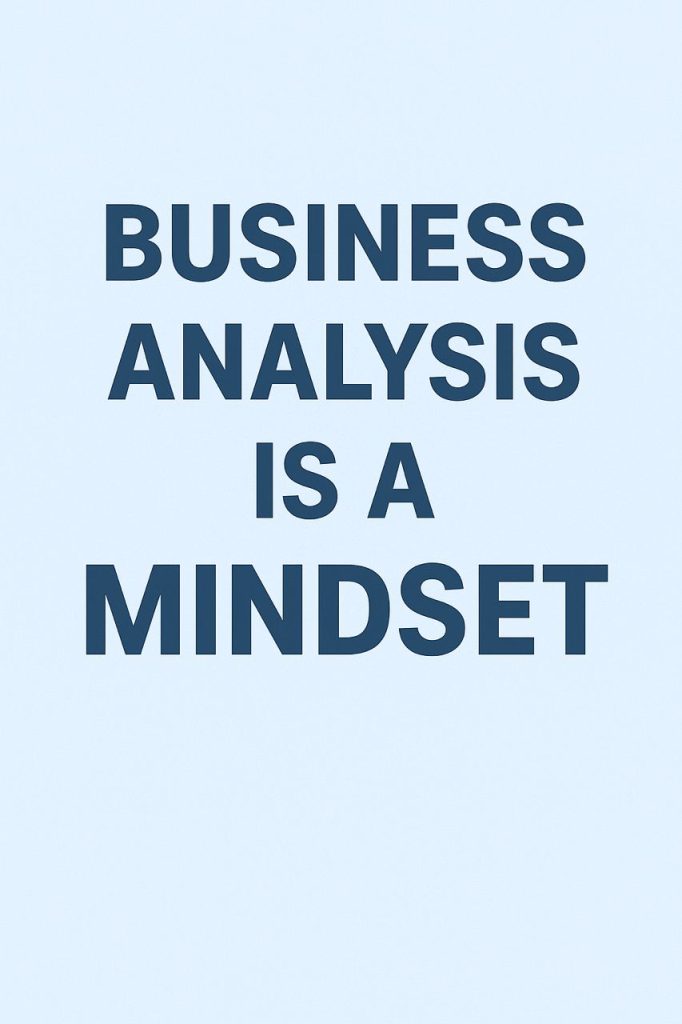When people hear business analysis, they often think of documentation, process diagrams, or requirements gathering. But the truth is—business analysis isn’t a role; it’s a mindset. It’s about seeing beyond the obvious, asking the right questions, and connecting dots others might miss.
Whether you carry the title Business Analyst or not, the ability to think analytically, interpret data, and align business goals with user needs has become indispensable in today’s workplace. From product managers and project coordinators to marketers and developers—everyone who drives change is, in some way, performing business analysis.
- Business Analysis: More Than a Job Description
At its core, business analysis is the discipline of understanding problems and enabling change. But what sets great analysts apart isn’t just their technical skills—it’s their thinking framework.
A true business analyst doesn’t just take orders or record requirements; they challenge assumptions. They ask “why?” until the real issue surfaces. They bridge the gap between strategy and execution, helping organizations avoid costly missteps.
In a world where industries evolve overnight, the BA mindset is a powerful advantage. It involves curiosity, empathy, strategic thinking, and systems awareness—the ability to see how one small change in process or technology can ripple across an entire organization.
“The future belongs to those who can connect insight with action.”
This mindset isn’t limited to business analysis professionals—it’s what makes agile teams, project managers, and data analysts thrive. It’s the foundation of value creation.
Keywords: business analysis mindset, business analyst skills, problem-solving, analytical thinking, agile business analysis, strategic decision-making, organizational change.
- The Shift from Tasks to Thinking
Traditionally, business analysts were seen as requirement gatherers—people who created documents and ensured developers built the right thing. But as businesses become more complex and digital transformation accelerates, this narrow view no longer works.
Modern business analysts are change catalysts. They analyze data, map customer journeys, evaluate risks, and connect strategy to measurable outcomes.
In Agile environments, this mindset shines even brighter. Instead of waiting for detailed requirement documents, analysts work alongside Scrum teams, defining user stories, clarifying acceptance criteria, and ensuring continuous alignment with business goals.
The focus is no longer “What do we need to build?” but “Why are we building this, and how does it create value?”
Adopting the BA mindset means becoming a translator of needs—a professional who helps organizations make smarter, faster, and more confident decisions.
- Core Elements of the BA Mindset
The business analysis mindset can be broken down into several key traits. These are the habits and attitudes that distinguish those who add true value in any business environment:
1. Curiosity
Great analysts don’t accept surface answers. They explore root causes, study systems, and continuously ask, “What’s really going on here?”
2. Empathy
A BA’s work begins and ends with understanding people—customers, stakeholders, and team members. Empathy allows analysts to uncover the real needs behind the stated requirements.
3. Strategic Thinking
Every project exists for a reason. Analysts see the bigger picture, connecting operational details to long-term business goals.
4. Adaptability
Markets change, teams evolve, and priorities shift. A BA mindset embraces uncertainty as part of the process.
5. Evidence-Based Decision Making
Data is at the heart of modern business analysis. Analysts use quantitative and qualitative data to drive recommendations, ensuring solutions are grounded in reality.
6. Communication
It’s not just what you know—it’s how you share it. The ability to simplify complex information and foster understanding is one of the analyst’s greatest strengths.
Together, these traits form a mindset that is both analytical and human-centered—precisely what the modern workplace needs.
- The BA Mindset in Agile Teams
In Agile teams, business analysis is woven into every sprint, backlog refinement, and retrospective. The Agile Business Analyst plays a dynamic role—helping the Product Owner clarify value, ensuring the Scrum team understands the “why,” and aligning deliverables with the organization’s OKRs (Objectives and Key Results).
Analytics, data visualization, and continuous improvement tools empower this process. But tools alone don’t make Agile successful—it’s the mindset behind them.
A Scrum team equipped with BA thinking delivers more than features—it delivers outcomes. This is what separates teams that finish work from those that create impact.
Keywords: Agile business analysis, Scrum teams, continuous improvement, stakeholder collaboration, requirements in Agile, OKRs, customer value.
- Why Every Professional Needs a BA Mindset
Even outside formal BA roles, the mindset of analysis is critical. In marketing, it means understanding the data behind consumer behavior. In HR, it’s identifying patterns in employee engagement. In operations, it’s finding process inefficiencies before they become bottlenecks.
In short every successful professional today is, at their core, an analyst.
That’s why organizations are investing in business analysis training—not just to fill job titles, but to build teams that think critically and act decisively.
Courses like ScrumConsult’s Business Analysis Certification programs are built on this principle. They equip learners with analytical frameworks, Agile practices, and communication skills that empower them to thrive in modern workplaces—whether as Business Analysts, Product Owners, or Agile Project Managers.
Ready to take your skills to the next level?
Enroll today and transform your career with ScrumConsult’s professional training programs. From Scrum Master Certification in Lagos to Agile Expert, Project Management, Business Analysis, Lean Six Sigma Green & Black Belt, SMC, PSM, and CSM, we provide the tools and knowledge you need to thrive in a data-driven world.
📌 Visit scrumconsult.com
today to get started.

